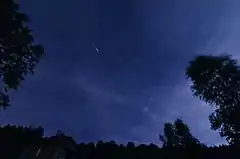| Sternschnuppen | |
|---|---|
| Secular choral work by Anton Bruckner | |
 Shooting star | |
| Key | F major |
| Catalogue | WAB 85 |
| Text | Ernst Marinelli |
| Language | German |
| Composed | c. 1848: Sankt Florian |
| Dedication | Bruckner's own men's quartet |
| Published | 1932: Regensburg |
| Vocal | TTBB quartet |
Sternschnuppen (Shooting stars), WAB 73, is a song, which Anton Bruckner composed for his own men's voice quartet in c. 1848 during his stay in the Sankt Florian.
History
Bruckner composed the song on a text of Ernst Marinelli in c. 1848. He dedicated it to his own men's voice quartet, which was composed of Ludwig Ehrenecker, Franz Schäfler, Johann Nepomuk Hueber and himself. It is not known when the piece was first performed.[1][2][3]
The original manuscript is stored in the archive of the St. Florian Abbey.[1][2] The piece was first published in band II/2, pp. 94-96 of the Göllerich/Auer biography. It was thereafter issued in 1954, together with Ständchen, in the Chorblattreihe of Robitschek, Vienna.[1][2] The piece is issued in Band XXIII/2, No. 5 of the Gesamtausgabe.[4]
Text
Sternschnuppen is using a text by Ernst Marinelli.
Wenn Natur die sanften Lider |
When nature tilts her gentle lids |
Music
The 38-bar long work in F major is scored for TTBB quartet.[2] In the Göllerich/Auer biography the song is described as follows: Über dem Ganzen liegt die weichliche Romantik der damals beliebten Männerchor-Musik (On the whole piece rests the softish romanticism of the at that time popular men's choir-music).[1]
Discography
A selection among the few recordings of Sternschnuppen:
- Guido Mancusi, Chorus Viennensis, Musik, du himmlisches Gebilde! – CD: ORF CD 73, 1995
- Hubert Voigt, Thüringer Männerchor Ars Musica, Weltliches und Geistliches – CD issued by the choir, 2012 live
References
Sources
- August Göllerich, Anton Bruckner. Ein Lebens- und Schaffens-Bild, c. 1922 – posthumous edited by Max Auer by G. Bosse, Regensburg, 1932
- Anton Bruckner – Sämtliche Werke, Band XXIII/2: Weltliche Chorwerke (1843–1893), Musikwissenschaftlicher Verlag der Internationalen Bruckner-Gesellschaft, Angela Pachovsky and Anton Reinthaler (Editor), Vienna, 1989
- Cornelis van Zwol, Anton Bruckner 1824–1896 – Leven en werken, uitg. Thoth, Bussum, Netherlands, 2012. ISBN 978-90-6868-590-9
- Uwe Harten, Anton Bruckner. Ein Handbuch. Residenz Verlag, Salzburg, 1996. ISBN 3-7017-1030-9.
- Crawford Howie, Anton Bruckner - A documentary biography, online revised edition
External links
- Sternschnuppen, WAB 85: Scores at the International Music Score Library Project
- Sternschnuppen F-Dur, WAB 85 – Critical discography by Hans Roelofs (in German)
- Live performances of Sternschnuppen can be heard on YouTube:
- the Wagner Society Male Choir of Japan, 11 December 1988: Sternschnuppen
- the Schwuler Männerchor Zürich, 2015: Sternschnuppen